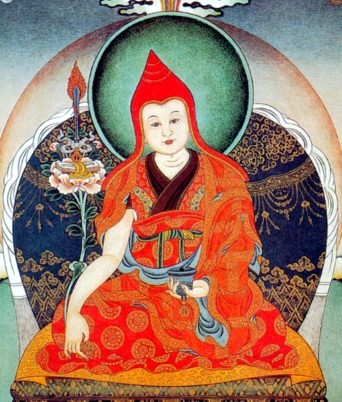Three sets of vows: Difference between revisions
Jump to navigation
Jump to search
No edit summary |
No edit summary |
||
| Line 10: | Line 10: | ||
#the [[dhyana]] vows; and <br> | #the [[dhyana]] vows; and <br> | ||
#the vows of undefilement. | #the vows of undefilement. | ||
==Essence of the Vows== | |||
[[Dudjom Rinpoche]] said: | |||
*To abandon entirely all negative intentions and actions of body, speech and mind that might cause harm to others is the essence of the pratimoksha, or vows of individual liberation. | |||
*To practise wholeheartedly all types of virtue that bring benefit to others is the essence of the bodhisattva's vows. | |||
*At the root of these two is taming one's own unruly mind by means of [[mindfulness]], [[vigilance]] and [[conscientiousness]], and training oneself to recognize the all-encompassing purity of appearance and existence. This is the essence of the vows of secret mantra.<ref>http://www.lotsawahouse.org/mirror.html</ref> | |||
==Major Texts== | ==Major Texts== | ||
*[[Ngari Panchen Pema Wangyal]], ''[[Ascertainment of the Three Types of Vows]]'' | *[[Ngari Panchen Pema Wangyal]], ''[[Ascertainment of the Three Types of Vows]]'' | ||
*[[Sakya Pandita]], ''[[Clear Differentiation of the Three Sets of Vows]]'' | *[[Sakya Pandita]], ''[[Clear Differentiation of the Three Sets of Vows]]'' | ||
==Notes== | |||
<small><references/></small> | |||
==Further Reading== | ==Further Reading== | ||
*Geshe Sonam Rinchen, ''The Bodhisattva Vow'', translated and edited by Ruth Sonam, Ithaca: Snow Lion, 2000 | *Geshe Sonam Rinchen, ''The Bodhisattva Vow'', translated and edited by Ruth Sonam, Ithaca: Snow Lion, 2000 | ||
*Jamgön Kongtrul Rinpoche, ''The Treasury of Knowledge, Book Five: Buddhist Ethics'', Ithaca: Snow Lion, 2003 | *Jamgön Kongtrul Rinpoche, ''The Treasury of Knowledge, Book Five: Buddhist Ethics'', Ithaca: Snow Lion, 2003 | ||
Revision as of 08:28, 4 August 2009

The three sets of vows (Skt. trisaṃvara; Tib. dom sum; Wyl. sdom gsum) are:
- the vows of pratimoksha or of individual liberation (sotar gyi dompa);
- the bodhisattva vows (changchub sempé dompa);
- the samayas of the secret mantrayana (sang ngag kyi dompa).
An alternative list is:
- The vows of pratimoksha;
- the dhyana vows; and
- the vows of undefilement.
Essence of the Vows
Dudjom Rinpoche said:
- To abandon entirely all negative intentions and actions of body, speech and mind that might cause harm to others is the essence of the pratimoksha, or vows of individual liberation.
- To practise wholeheartedly all types of virtue that bring benefit to others is the essence of the bodhisattva's vows.
- At the root of these two is taming one's own unruly mind by means of mindfulness, vigilance and conscientiousness, and training oneself to recognize the all-encompassing purity of appearance and existence. This is the essence of the vows of secret mantra.[1]
Major Texts
- Ngari Panchen Pema Wangyal, Ascertainment of the Three Types of Vows
- Sakya Pandita, Clear Differentiation of the Three Sets of Vows
Notes
Further Reading
- Geshe Sonam Rinchen, The Bodhisattva Vow, translated and edited by Ruth Sonam, Ithaca: Snow Lion, 2000
- Jamgön Kongtrul Rinpoche, The Treasury of Knowledge, Book Five: Buddhist Ethics, Ithaca: Snow Lion, 2003
- Lama Mipham's Commentary to Nagarjuna's Stanzas for a Novice Monk and Tsongkhapa's Essence of the Ocean of Vinaya, translated by Glen H. Mullin and Lobsang Rapgay, Library of Tibetan Works and Archives, 1978
- Ngari Panchen, Perfect Conduct: The Absolute Certainty of the Three Vows with commentary by Dudjom Rinpoche, Boston: Wisdom, 1996
- Sakya Pandita Kunga Gyaltsen, A Clear Differentiation of the Three Codes: Essential Distinctions among the Individual Liberation, Great Vehicle, and Tantric Systems, translated by Jared Rhoton, New York: SUNY, 2002
- Tsongkhapa, Tantric Ethics: An Explanation of the Precepts for Buddhist Vajrayana Practice, translated by Gareth Sparham, Boston: Wisdom, 2005